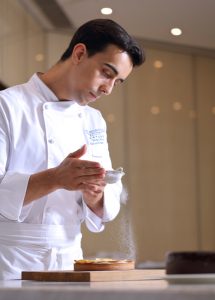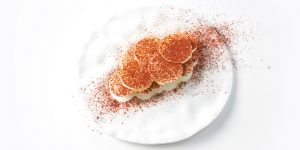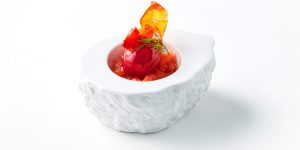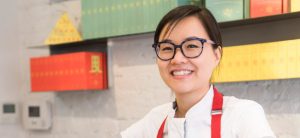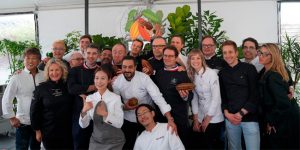Italian Pastry Chefs Jacopo Bruni Pastry Interviews
Jacopo Bruni: “A good dessert should be the one to involve as many senses as possible”
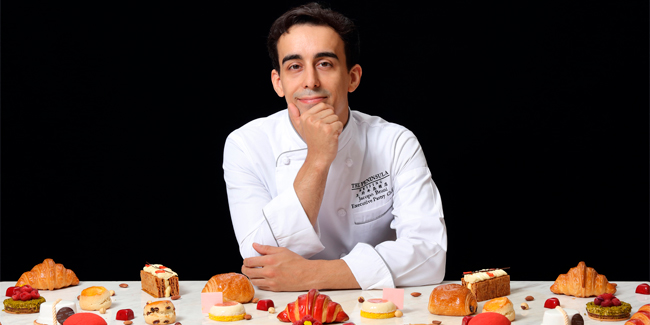
When it comes to spending money, the Chinese don’t think twice! The rapid growth of their well-established economy has made this city one of the largest metropolises in the world, attracting millions of visitors from all over the world every year. Beijing is home to some of the world’s most amazing restaurants and hotels, even though the city is not included in the Michelin Guide, there are incredible fine dining restaurants. During my last visit I had the opportunity to stay at the Peninsula hotel where I had the pleasure to meet and interview Chef Frederic Moreau. Today, the hotel has a new Executive Pastry Chef: Jacopo Bruni.
What defines the Peninsula Hotel Company is elegance, glamour, style and tradition. Located in Beijing’s historic Wangfujing area, it first opened its doors as The Palace hotel, China’s first luxury hotel.The hotel was bought by the Peninsula Hotel Group and after a 123-million-dollar renovation, it reopened its doors in 2017. Since its opening, The Peninsula Beijing has hosted a range of prominent visitors and high elite clientele offering stunning facilities and world class service.
Renowned for his exquisite and visually striking pastry creations, Jacopo Bruni is the new Executive Pastry Chef. His love for pastry work is based on his love for pastry. He began his career during his studies at ALMA, the International School for the Italian Cuisine in the city of Parma. Under the mentorship of Massimiliano Alajmo, he was awarded a degree for Master of Italian Cuisine.“Some of the most important things Chef Massimiliano taught me were techniques and theory, but the most important thing I learnt was the philosophy behind a dish”, he says.
Soon after, Chef Bruni followed his dreams and joined Chef Andrea Constantini’s team at the Regina Adelaide hotel.“I was mentored by the chef who taught me new techniques, recipes and personal advice but the most important thing Chef Andrea taught me was respect and work ethics”.
“Transforming a simple idea into something concrete and tangible is art, but going further in transforming that idea into something concrete and full of flavor is beyond art”
Chef Bruni took the position as Executive Pastry Chef for the newly opened Inkiostro restaurant, located within Ink 24 Hotel, also in Parma. In 2013 Chef Bruni then moved to the St Regis San Clemente Palace in Venice, before moving to London where he spent the next several years as Executive Pastry Chef at some of the city’s hotels such as The Connaught Hotel, Baglioni Hotel, and The London EDITION. In February of 2018, Chef Bruni was invited to join the newly opened The Shanghai EDITION as Executive Pastry Chef.
Using traditional Chinese ingredients, Chef Bruni has created a new line of desserts. His creations can be described as simple, yet complex. Chef Bruni looks for every true beauty, his desserts are well composed. When you eat them you can taste the flavors and textures developing as you taste them, he evokes flavors from the past to bring back a memory creating something special to remember one day. Chef Bruni’s highly creative, whimsical, and delectable desserts incorporate Chinese flavors and ingredients. Bruni’s technical mastery allows him to combine aesthetics and flavors into his recipes – such as jasmine tea, Hangzhou green tea, Asian pear, and even durian fruit.
Why did you decide to take the position as Executive Pastry Chef for the Peninsula Hotel and why Beijing?
Peninsula is one of the best companies for pastry chefs. In order to fully engage its guests by giving the best experience, this company won’t compromise the quality of the ingredients for any reason. Peninsula Beijing now is focusing on chocolate, and we are going to open a new chocolate room in the following months, coming along with a brand new pastry boutique. It is quite a great opportunity for me, I am very excited about it.
What are your expectations and what have been your major challenges when you moved to work here?
I am planning to establish the pastry boutique which could bring joy and sweetness to both normal days and special moments. The language barrier is my major challenge for now, but I am trying to meet the challenge by learning Chinese as much as possible.
“Peninsula is one of the best companies for pastry chefs. In order to fully engage its guests by giving the best experience, this company won’t compromise the quality of the ingredients for any reason”
Tell us about the difference between working in Asia and working in Europe. What is it that you like the most?
Communication and the culture are different and as foreigners we have to understand that first and after adapt yourself to get results in the local way.
The variety of the ingredients and the culture for sure, and in each team is like a family. Everyone calls each other brother and sister if they are on the same level and big brother or big sister if they are above, which is nice.
The communication at work is quite different between Asian culture and European culture. As a foreigner working in Asia , I tend to learn and understand various ingredients and different cultures until I figure out how to fit in the local way.
What in your opinion will play an important role in tendencies for the coming year in Beijing?
The coming up Michelin guide, along with some famous chefs, will bring new influences, inspiring chefs and guests to take new approaches toward cuisines.
How do you challenge yourself to be a better Pastry Chef?
I change the menu every season for all the outlet and I never use twice the same dish twice to try to take me out of my comfort zone and always looking for a new signature dish.
I always challenge myself by getting out of my comfort zone by changing all the menus every season and using only new dishes, it motivates me to keep trying and experimenting new things and techniques.
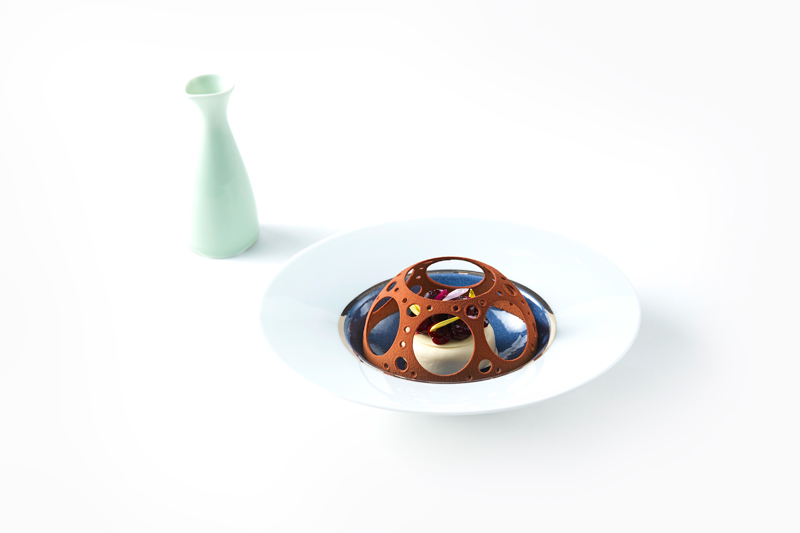
“I always challenge myself by getting out of my comfort zone by changing all the menus every season and using only new dishes, it motivates me to keep trying and experimenting new things and techniques.”
Where do you get your inspiration when it comes to creating?
I get inspired mostly by my childhood memories, travel experiences, and learning from other chefs.
What are your favorite local ingredients and how do you use them in your creations?
I am amazed by the variety of spices and fruit here in China. I love silver tips imperial tea with rare bouquent and Chinese hickory. It’s like pecan with a chocolate flavour.
When you make a new dessert, what guidelines do you follow and why?
A beautiful and elegant treat for the eyes; a fragrant treat for the sense; a different and exciting texture and taste. I also always hope that my new desserts with good flavors could trigger memories.
“A beautiful and elegant treat for the eyes; a fragrant treat for the sense; a different and exciting texture and taste. I also always hope that my new desserts with good flavors could trigger memories.”
What is the most important element for you when you create a dessert?
Beauty, tastiness, and the ability to recall memories. A good dessert should be the one to involve as many senses as possible. What’s more, each dessert should be adaptive to different cultures. The receiving of sweetness, fatness, and acidness may be significantly different among Asia, Europe, and the US.
How do you see the culinary evolution in Beijing, its trends and new concepts?
New communication offers me an opportunity to get to know recipes, techniques, and chefs.
There are more and more new pastry schools which bring chefs from all around the world to share trainings.
Nowadays we can see more chefs coming from Russia or Ukraine in the international scene, I hope we will have more great chefs from China soon.
Tell us about the desserts you are creating for the Boutique Pastry Shop of the Peninsula Hotel?
In China, you may find that the most common cake here is mousse cake. Although mousse cake is easier to produce, I still prefer to make traditional baked cakes with Chinese influences like custard tart, matcha mille crepes, sacher torte, or chiffon cake.
For our boutique, we integrate éclair after meeting Joakim Prat, praline after meeting Ronya Beloya and Andrey Dubovik, and bakery after meeting Johan Martin this year.
It is a great boutique where you can find confiseries, cake, chocolate, pastry, and bakery all in one place.
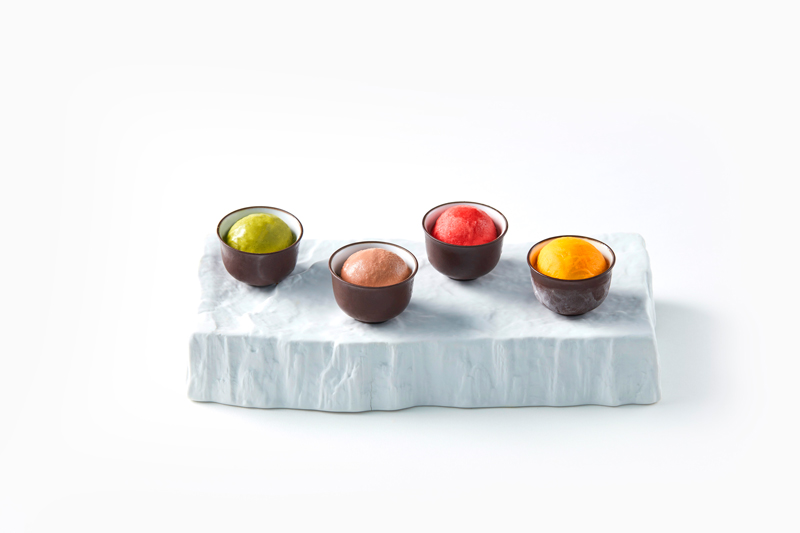
“In China, you may find that the most common cake here is mousse cake… but I still prefer to make traditional baked cakes with Chinese influences”
How do you express your frustrations in the kitchen? How do you manage?
Frustrations bring negative energy easily, so I have to manage emotions and avoid impulsiveness. With the language barrier and cultural differences, I need to be calmer and more patient while addressing the frustrations for efficient communication. I believe that positivity is as contagious as negativity.
Name 3 of your mentors and explain why
Andera Costantini, my first chef after school. He had several years of working experience at 2 Michelin star restaurants. He was always willing to share and support. I feel lucky to have him as my initial mentor. He paid attention to details. I remembered he used to teach me how to clean the table or the sponge. Beside him, I never saw any other Executive chef who would teach trainees about cleaning.
Matteo Berti, my pastry teacher at ALMA. His tough teaching style prepared me later for kitchen life. He taught me not to give up especially in hard times. I am very grateful that he set a great example on getting through challenges and turning into a determined chef.
My father, a knowledgeable and talented man with great academic background, is always supportive to my career choices even if sometimes he may have different expectations and ideas. He understood pastry is the purpose of my life when he saw the passion and excitement in my eyes. I feel his great support every day, even though now he is thousands of miles away from me now. I appreciate his encouragement and support a lot along my journey of becoming a pastry chef.
